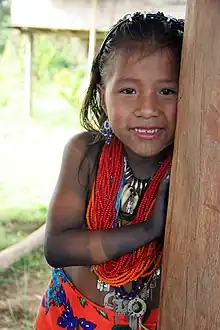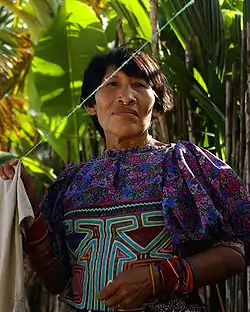


Indigenous peoples of Panama, or Native Panamanians, are the native peoples of Panama. According to the 2010 census, they make up 12.3% of the overall population of 3.4 million, or just over 418,000 people. The Ngäbe and Buglé comprise half of the indigenous peoples of Panama.[1]
Many of the Indigenous Peoples live on comarca indígenas,[2] which are administrative regions for areas with substantial Indigenous populations. Three comarcas (Comarca Emberá-Wounaan, Guna Yala, Ngäbe-Buglé) exist as equivalent to a province, with two smaller comarcas (Guna de Madugandí and Guna de Wargandí) subordinate to a province and considered equivalent to a corregimiento (municipality).
Indigenous groups
- Bokota, Bocas Del Toro
- Embera, southeastern Darién Province
- Guaymí (including the Movere and Murire peoples), mainly Chiriquí Province
- Guna, Darién Province and Caribbean side.
- Buglé, mainly Chiriquí Province
- Talamanca
- Teribe[1]
- Wounaan, southeastern Darién Province
- Emberá-Wounaan, mainly Emberá-Wounaan Comarca
- Bribri
Languages
Some native peoples speak Spanish, while many more retain their traditional languages. According to the 2000 census, the following indigenous languages are spoken in Panama:
- Bokota language: 933 speakers (in Panama)
- Bri-bri language: 2,521 speakers
- Buglé language: 17,731 speakers
- Emberá language: 22,485 speakers
- Guna Language: 61,707 speakers
- Naso-Teribe language: 3,305 speakers
- Ngöbe language: 169,130 speakers
- Wounaan language: 6,882 speakers[2]
Notes
- 1 2 "Panama History: Indigenous People." Archived 2010-11-25 at the Wayback Machine Panama Experts. (retrieved 23 Feb 2011)
- 1 2 "Indigenous Peoples in Panama." Archived 2011-03-02 at the Wayback Machine International Work Group for Indian Affairs. (retrieved 23 Feb 2011)
.svg.png.webp)